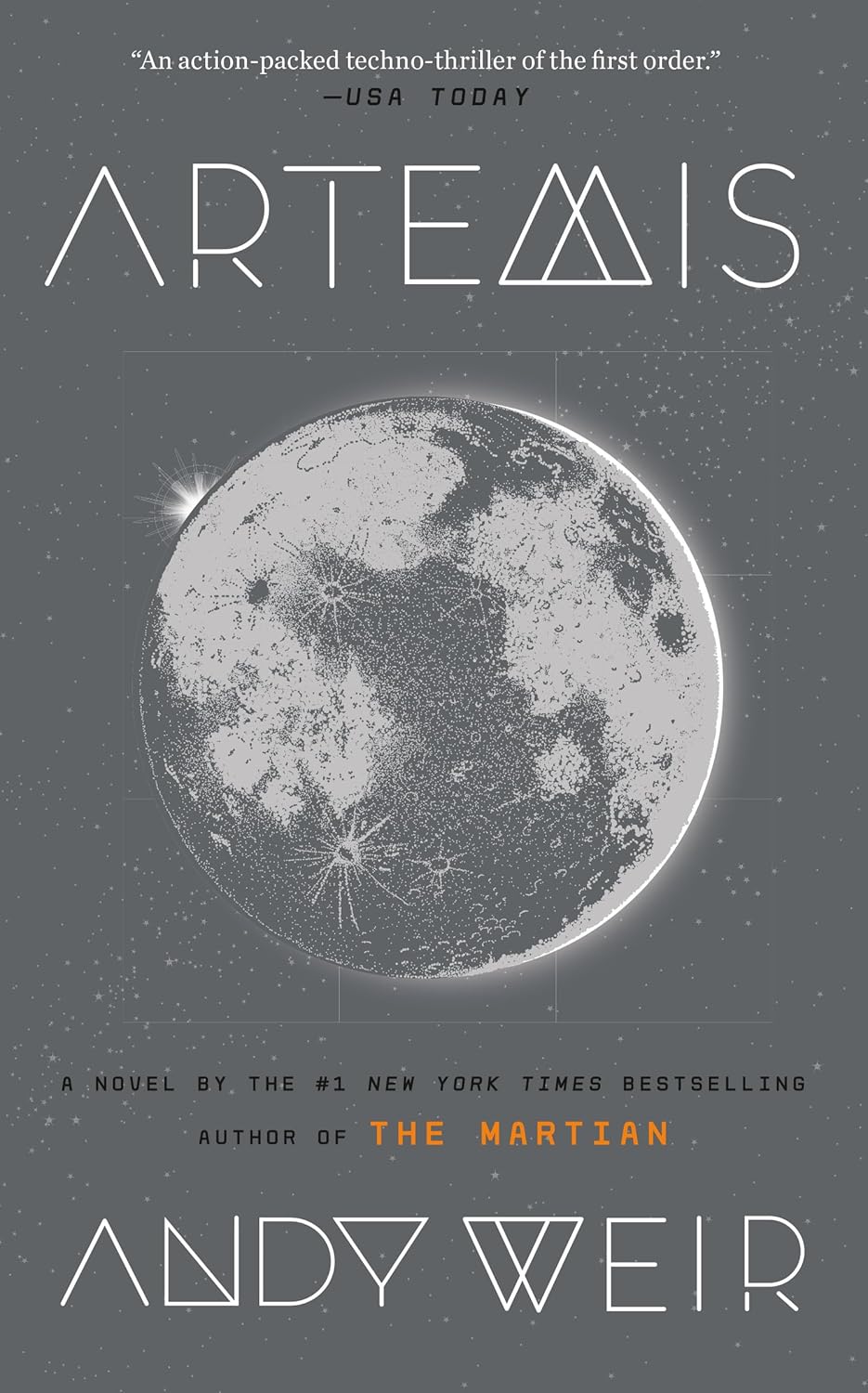When Andy Weir burst onto the literary scene with “The Martian,” he didn’t just write a book; he redefined a subgenre. His unique blend of hard science, ingenious problem-solving, and laugh-out-loud humor captivated millions, proving that science fiction could be both rigorously accurate and incredibly entertaining. So, when “Artemis” was announced, the anticipation was palpable. Could Weir capture that same magic, or would the sophomore slump claim another victim? Having now journeyed to the moon with Jazz Bashara, the protagonist of “Artemis,” I can confidently say that while it dances to a slightly different rhythm than its predecessor, it delivers a thoroughly engaging and clever ride. This Artemis book review will delve into why this lunar caper is a must-read for sci-fi fans and anyone looking for a smart, fun adventure.
The Moon’s Underbelly: A Plot Overview
“Artemis” transports us to the year 2080, to the first and only city on the Moon: Artemis. This isn’t some gleaming utopia, but a bustling, lived-in, and somewhat gritty tourist trap and research hub. Our guide through this lunar landscape is Jasmine “Jazz” Bashara, a twenty-six-year-old Saudi Arabian porter and occasional smuggler. Jazz is smart, resourceful, deeply in debt, and perpetually sarcastic – a character who practically leaps off the page with her cynical charm and quick wit.
The plot kicks off with Jazz barely scraping by, earning her living by carrying cargo for the wealthy tourists and performing illicit “side hustles” that involve smuggling contraband like Cuban cigars and unapproved oxygen tanks into Artemis. Her life is a constant tightrope walk between making enough money to survive and avoiding the watchful eye of the KSC (Kenya Space Centre), which governs the lunar city.
The real story begins when a wealthy, eccentric client, Trond Landvik, approaches Jazz with an offer too good to refuse: a massive sum of money to sabotage a crucial aluminum production facility in Artemis. The job is dangerous, complex, and highly illegal, but the payout promises to erase all of Jazz’s debts and set her up for life. Desperate and seeing no other way out of her financial hole, Jazz agrees.
What starts as a seemingly straightforward act of industrial espionage quickly unravels into a complex web of corporate intrigue, murder, and political conspiracy that threatens the very existence of Artemis. Jazz finds herself caught between powerful, ruthless factions, forced to use every ounce of her street smarts and scientific knowledge to survive and, ultimately, save the city she calls home. The stakes escalate with each chapter, turning a simple heist into a desperate fight for survival, making this Artemis book review highlight the thrilling twists and turns.
Weir masterfully weaves scientific detail into the narrative, explaining the intricacies of lunar living, from airlocks and oxygen recycling to the physics of low gravity and the challenges of manufacturing on the Moon. This scientific backbone grounds the fantastical elements of the plot, making Artemis feel incredibly real and lived-in. The tension builds steadily as Jazz navigates betrayals, near-misses, and impossible deadlines, all while dealing with the unique challenges of a lunar environment. It’s a story that keeps you guessing, cheering for Jazz, and marveling at Weir’s ability to make complex science not just understandable, but exciting.
Character Deep Dive: Jazz Bashara and the Ensemble
One of the greatest strengths of “Artemis” lies in its protagonist, Jazz Bashara. If Mark Watney from “The Martian” was the quintessential optimistic, problem-solving engineer, Jazz is his morally ambiguous, street-smart counterpart. She’s a brilliant, self-taught engineer and physicist, but her intelligence is often overshadowed by her impulsiveness, her tendency to make questionable decisions, and her deep-seated financial woes.
Jazz is undeniably flawed, and that’s precisely what makes her so compelling. She’s sarcastic to a fault, often using humor as a defense mechanism, even in the direst situations. Her internal monologue is a constant stream of witty observations, self-deprecating jokes, and genuine fear. You root for her not because she’s a hero in the traditional sense, but because she’s a survivor, a quick thinker, and, despite her criminal tendencies, possesses a surprising moral compass that emerges when it truly matters. Her relationships, particularly with her estranged father and her best friend Dale, add layers of emotional depth to her character, revealing the vulnerabilities beneath her tough exterior.
Beyond Jazz, Weir populates Artemis with a colorful cast of supporting characters, each playing a crucial role in the unfolding drama:
- Dale: Jazz’s best friend and a talented welder, Dale provides a moral anchor and a source of unwavering loyalty. Their banter is a highlight of the book, showcasing a genuine friendship forged under the unique pressures of lunar life.
- Trond Landvik: The wealthy Norwegian businessman who initiates the heist. He’s enigmatic and somewhat ruthless, pushing Jazz into a world far more dangerous than she anticipated.
- Lando: The head of the KSC, responsible for law and order in Artemis. He’s a constant thorn in Jazz’s side, representing the authority she constantly tries to evade.
- Svoboda: A Ukrainian scientist and a key figure in the aluminum production facility. He becomes an unwitting pawn in the larger conspiracy, and Jazz’s interactions with him are both humorous and pivotal.
- Kelvin: Jazz’s father, a devout Muslim who runs a welding business. Their strained relationship is a recurring theme, adding a personal dimension to Jazz’s struggles.
- Jin Chu: A Chinese businessman with a mysterious agenda, representing another powerful faction vying for control in Artemis.
While Jazz is undoubtedly the star of the show, the supporting cast, though perhaps not as deeply explored as Jazz herself, serves to flesh out the lunar society and provide various challenges and alliances for our protagonist. Their interactions drive the plot forward and showcase the diverse community that has taken root on the Moon. This focus on a relatable, flawed protagonist and a well-defined supporting cast is a key element in any comprehensive Artemis book review.
Themes Explored in Artemis
Andy Weir’s “Artemis” is more than just a thrilling heist novel; it’s a thoughtful exploration of several compelling themes, all set against the backdrop of humanity’s first lunar city.
Resourcefulness and Ingenuity
Much like “The Martian,” “Artemis” celebrates the human capacity for problem-solving under extreme pressure. Jazz Bashara, despite her lack of formal training beyond what she’s picked up, is a master of improvisation. Whether she’s fabricating a custom tool from scrap metal, calculating complex orbital mechanics on the fly, or devising intricate plans to evade security, her ingenuity is constantly on display. Weir revels in the details of how things work, and how Jazz figures out how to make them work better or differently to achieve her goals. This theme is central to the appeal of Weir’s work, and it shines brightly in this Artemis book review.
The Challenges and Realities of Space Settlement
“Artemis” paints a realistic, if slightly cynical, picture of what living on the Moon might actually be like. It’s not just about the awe and wonder of space; it’s about the mundane, the difficult, and the often grubby realities. Weir meticulously details the infrastructure required to sustain life: oxygen production, waste management, power generation, and the constant threat of equipment failure. He explores the economic models that would drive such a settlement, highlighting the reliance on tourism and the struggle to find sustainable industries. The city of Artemis feels less like a grand vision and more like a frontier town, with its own social strata, black markets, and political maneuvering. This grounded approach to space colonization adds significant depth.
Crime, Consequences, and Moral Ambiguity
At its core, “Artemis” is a crime novel. Jazz is a smuggler, and the central plot revolves around a major act of sabotage. The book delves into the motivations behind criminal acts – in Jazz’s case, desperation and debt – and explores the escalating consequences of her choices. It also touches on the moral gray areas that emerge when survival is paramount. Jazz isn’t a villain, but she’s certainly not a traditional hero. Her journey forces readers to consider the line between right and wrong when faced with impossible choices, and how far one might go to protect themselves and those they care about.
Family and Loyalty
Despite her independent and often rebellious nature, Jazz’s relationships with her father, Kelvin, and her best friend, Dale, are crucial to her character arc. The strained but loving dynamic with her father provides a grounding element, hinting at her past and the reasons for her current financial predicament. Her unwavering loyalty to Dale, and his to her, underscores the importance of human connection in an isolated environment. These personal relationships add an emotional resonance to the high-stakes plot, reminding us that even on the Moon, human bonds are what truly matter.
Economic Disparities and Corporate Power
Weir subtly weaves in themes of economic inequality. Artemis is a city built on tourism, catering to the ultra-rich who can afford a trip to the Moon. Jazz, and many like her, are working-class residents struggling to make ends meet, often exploited by the very system that allows them to live there. The larger conspiracy in the book revolves around corporate control and the ruthless pursuit of profit, highlighting how even in a futuristic lunar society, power dynamics and greed can drive events.
Through these interwoven themes, “Artemis” becomes a richer, more thought-provoking narrative than a simple heist story. It invites readers to consider not just the “how” of lunar living, but the “why” and the “what if” of humanity’s expansion into space.
Language and Narrative Style
Andy Weir has a distinctive voice, and it’s on full display in “Artemis.” The novel is told in the first person, entirely from Jazz Bashara’s perspective, which immediately immerses the reader in her mind. This choice is crucial because Jazz’s personality is the engine of the story. Her narration is:
- Witty and Sarcastic: Jazz’s internal monologue is packed with dry humor, clever one-liners, and self-deprecating remarks. She uses sarcasm as a shield and a coping mechanism, even when facing life-or-death situations. This consistent comedic tone lightens the tension and makes her an incredibly engaging narrator.
- Technically Detailed yet Accessible: Weir’s hallmark is his “hard science fiction” approach. He doesn’t shy away from explaining the intricate physics, chemistry, and engineering required for lunar living or for Jazz’s various schemes. However, he does so in a way that is remarkably clear and digestible, often breaking down complex concepts with relatable analogies or Jazz’s own pragmatic, often humorous, explanations. You might learn about thermodynamics or orbital mechanics without even realizing it, because it’s so seamlessly integrated into the plot.
- Fast-Paced and Thrilling: Despite the scientific explanations, the pacing of “Artemis” is relentless. Once the heist begins, the plot moves at a breakneck speed, with Jazz constantly facing new challenges, betrayals, and ticking clocks. Weir excels at building suspense and delivering satisfying plot twists that keep the reader on the edge of their seat.
- Conversational and Engaging: Jazz’s voice feels incredibly natural and conversational, as if she’s speaking directly to the reader. This creates an immediate rapport and makes it easy to become invested in her predicament. The language is modern, informal, and full of personality, avoiding overly formal or academic prose.
Weir’s narrative style is a significant part of the charm of “Artemis.” He manages to make complex scientific problem-solving feel like a puzzle you’re solving alongside the protagonist, rather than a dry lecture. The humor is never forced but arises organically from Jazz’s personality and the absurd situations she finds herself in. This blend of scientific rigor, thrilling plot, and engaging voice ensures that the Artemis book review consistently praises its narrative strength.
Strengths of Artemis
In an Artemis book review, it’s essential to highlight the elements that make this novel shine. While it inevitably invites comparisons to “The Martian,” “Artemis” stands strong on its own merits, offering a unique and compelling lunar adventure.
1. An Unforgettable Protagonist
Jazz Bashara is arguably the book’s greatest asset. She’s not a perfect hero; in fact, she’s far from it. Her flaws – her impulsiveness, her criminal tendencies, her debt – make her incredibly human and relatable. Yet, her sharp wit, scientific acumen, and sheer determination make her utterly captivating. Her internal monologue is a constant source of entertainment, filled with sarcastic observations and ingenious problem-solving. You can’t help but root for her, even when she’s making questionable decisions, because her survival instincts and underlying good nature shine through.
2. Immersive World-Building
Weir’s depiction of Artemis, the lunar city, is nothing short of brilliant. It feels lived-in, gritty, and entirely plausible. From the detailed descriptions of the city’s “bubbles” and airlocks to the economics of lunar tourism and the challenges of manufacturing in low gravity, every aspect is meticulously thought out. You can almost feel the low gravity, smell the recycled air, and see the bustling corridors. This level of detail makes Artemis a character in itself, a fascinating setting for a high-stakes story.
3. Scientific Accuracy and Ingenious Problem-Solving
Just like in “The Martian,” Weir’s commitment to hard science is evident throughout “Artemis.” He doesn’t just wave a magic wand; he explains how things work, why they work, and how Jazz uses her knowledge to overcome seemingly insurmountable obstacles. The solutions Jazz devises are clever, scientifically sound, and incredibly satisfying to read. This emphasis on realistic problem-solving is a hallmark of Weir’s style and a major draw for readers who appreciate intelligent science fiction.
4. Relentless Pacing and Engaging Plot
Once the central heist kicks off, “Artemis” becomes a relentless thrill ride. The plot is tightly constructed, with one challenge leading seamlessly into the next, building tension with each turn of the page. There are betrayals, narrow escapes, and unexpected twists that keep the reader guessing. Weir is a master of the ticking clock, and Jazz’s desperate race against time provides a constant source of suspense.
5. Humor and Wit
Despite the high stakes, “Artemis” is genuinely funny. Jazz’s sarcastic narration and her interactions with the other characters provide consistent comedic relief. The humor feels natural and never detracts from the seriousness of the plot; instead, it makes Jazz even more endearing and the narrative more enjoyable.
These strengths combine to make “Artemis” a thoroughly entertaining and intellectually stimulating read, cementing its place as a worthy successor in Andy Weir’s bibliography.
Weaknesses of Artemis
No Artemis book review would be complete without a balanced look at its potential drawbacks. While “Artemis” is a fantastic read, it does have a few areas where it might not fully meet every reader’s expectations, especially when compared to Andy Weir’s previous work.
1. The Shadow of “The Martian”
Perhaps the biggest challenge “Artemis” faces is the towering success of “The Martian.” It’s almost impossible for readers not to compare the two. While both feature resourceful protagonists solving impossible problems with science and wit, “The Martian” had a unique, isolated survival narrative that resonated deeply. “Artemis,” being a more traditional heist/conspiracy thriller, might feel less novel to some who were expecting a direct continuation of the “lone genius against the universe” trope. The stakes, while high, feel different, and some readers might miss the pure, unadulterated optimism of Mark Watney.
2. Supporting Characters Could Be Deeper
While Jazz Bashara is a brilliantly fleshed-out protagonist, some of the supporting characters, while functional for the plot, don’t always feel as fully realized. Characters like Trond Landvik or Jin Chu serve their purpose in driving the conspiracy, but their motivations and backstories aren’t explored with the same depth as Jazz’s. This isn’t a fatal flaw, as the story is firmly centered on Jazz, but a bit more complexity for the ensemble might have added another layer to the lunar society.
3. Technical Details Can Be Overwhelming for Some
Weir’s commitment to scientific accuracy is a major strength, but for readers less inclined towards detailed explanations of physics, chemistry, and engineering, some passages might feel a bit dense. While Jazz’s explanations are generally clear and witty, there are moments where the sheer volume of technical information could potentially slow down the narrative for those who prefer a less science-heavy approach. It’s a trade-off for the hard sci-fi authenticity, but it might not appeal to everyone.
4. The Ending’s Resolution
Without giving away spoilers, some readers might find the resolution of the central conflict a bit too neat or convenient, especially given the escalating complexity and danger throughout the book. While satisfying, it might lack the gritty, hard-won feel of some other parts of the narrative.
These points are relatively minor in the grand scheme of things and don’t detract significantly from the overall enjoyment of the book. They simply highlight areas where reader preferences might diverge or where the book doesn’t quite hit the same unique notes as its predecessor.
Reader Impressions & Outbound Links
When looking at the broader reception of “Artemis,” particularly on platforms like Amazon and Goodreads, a few common sentiments emerge, reinforcing many points in this Artemis book review.
Many readers, especially those who loved “The Martian,” praise Andy Weir’s continued ability to weave intricate scientific details into a thrilling narrative. The meticulous world-building of the lunar city of Artemis is frequently highlighted as a major draw, with readers appreciating the plausible and detailed depiction of life on the Moon. Jazz Bashara, the protagonist, is often cited as a standout character – her sharp wit, resourcefulness, and flawed humanity resonate strongly with many. Reviewers frequently mention her sarcastic humor as a key element that keeps the story engaging and light, even amidst high stakes.
The fast-paced plot and the clever problem-solving sequences are also consistently lauded. Readers enjoy the intellectual challenge of seeing Jazz navigate seemingly impossible situations using her scientific knowledge and street smarts. The book’s ability to make complex science accessible and entertaining is a recurring theme in positive reviews.
However, some common critiques echo the “weaknesses” discussed earlier. The most frequent comparison is, inevitably, to “The Martian.” While many enjoy “Artemis” on its own merits, some readers express a preference for the isolated survival narrative of Weir’s debut, finding the heist plot of “Artemis” to be less unique or emotionally impactful. A few also mention that while Jazz is a great character, some of the supporting cast could have used more development. Occasionally, the sheer volume of technical explanations, while appreciated by many, is noted as potentially slowing down the pace for others.
Despite these minor points, the general consensus is overwhelmingly positive. “Artemis” is widely regarded as a clever, entertaining, and scientifically rich science fiction novel that solidifies Andy Weir’s place as a master of the genre.
If this Artemis book review has piqued your interest, I wholeheartedly encourage you to pick up a copy. It’s a fantastic journey that will transport you to a vibrant lunar city and keep you on the edge of your seat.
You can find more reviews and discussions about “Artemis” and other great books on Goodreads
To learn more about Andy Weir and his other works, visit his official website: https://www.andyweirauthor.com/
And of course, if you’re ready to dive in, you can purchase “Artemis” directly from Amazon:
https://www.amazon.com/Artemis-Novel-Andy-Weir-ebook/dp/B06Y55SB48
Don’t miss out on this thrilling lunar adventure!
Personal Analysis, Insights, and Reflections
Stepping into the world of “Artemis” after the phenomenal success of “The Martian” felt like a familiar yet distinctly new experience. My personal journey through this book was one of constant engagement, punctuated by moments of genuine admiration for Andy Weir’s craft and a few minor quibbles that ultimately didn’t diminish the overall enjoyment.
What struck me most profoundly was Jazz Bashara herself. I’ve always been drawn to flawed protagonists, and Jazz embodies this perfectly. She’s not a moral paragon; she’s messy, she makes mistakes, and she’s driven by very human motivations like debt and a desire for a better life. Yet, her intelligence, her quick thinking, and her underlying sense of loyalty make her incredibly easy to root for. Her internal monologue, filled with sarcastic quips and self-aware observations, was a constant source of amusement. There were times I found myself chuckling aloud at her commentary, even as the stakes grew dire. Weir truly nailed the voice, making Jazz feel like a real person I could easily grab a coffee with (or, more accurately, a synthetic nutrient paste in a lunar habitat).
The world-building of Artemis itself was another highlight. Weir’s ability to make a fictional lunar city feel so utterly tangible is remarkable. He doesn’t just tell you there’s a city on the moon; he shows you its plumbing, its power grid, its social hierarchy, and its black market. The details about living in low gravity, the challenges of oxygen production, and the sheer logistics of maintaining a human settlement hundreds of thousands of miles from Earth were fascinating. It’s this commitment to scientific realism that elevates Weir’s work beyond typical sci-fi, making the fantastical feel utterly plausible. As I read, I could almost feel the weightlessness and the constant hum of life support systems. This detailed immersion is a key factor in any positive Artemis book review.
The plot, while different from “The Martian,” was equally compelling in its own right. The transition from a survival story to a complex heist and conspiracy thriller was handled deftly. I appreciated the escalating stakes and the intricate layers of the plot. Just when I thought Jazz had solved one problem, another, more dangerous one would emerge. This kept the pages turning at a rapid pace, and I found myself devouring chapters late into the night. Weir’s talent for crafting intricate puzzles and then having his characters solve them with ingenuity is truly his superpower.
My main reflection, however, often circled back to the inevitable comparison with “The Martian.” While “Artemis” is a strong book, it didn’t quite capture the same emotional resonance for me. “The Martian” had a singular, almost primal struggle for survival that felt deeply personal and universally relatable. “Artemis,” with its larger cast and more intricate conspiracy, felt a bit more detached, despite Jazz’s compelling voice. This isn’t a criticism of “Artemis” as a standalone novel, but rather an acknowledgment of the incredibly high bar Weir set for himself.
Ultimately, “Artemis” is a testament to Andy Weir’s unique talent. He proves that he’s not a one-hit wonder and that his formula of hard science, quick wit, and compelling characters can be applied to different narrative structures with great success. It’s a book that entertains, educates, and leaves you with a renewed appreciation for human ingenuity, even when that ingenuity is applied to less-than-legal endeavors. For anyone seeking a smart, engaging, and thoroughly enjoyable science fiction read, this Artemis book review wholeheartedly recommends it.
Conclusion
In conclusion, “Artemis” is a vibrant, witty, and scientifically grounded lunar heist novel that firmly cements Andy Weir’s place as a master of accessible hard science fiction. While it may inevitably live in the shadow of its wildly successful predecessor, “The Martian,” it carves out its own distinct identity with a morally ambiguous yet utterly charming protagonist, Jazz Bashara, and a meticulously crafted lunar city that feels as real as any place on Earth.
From the ingenious problem-solving that defines Weir’s style to the rapid-fire wit of Jazz’s narration, the book offers a thrilling ride through the underbelly of humanity’s first off-world settlement. The detailed explanations of lunar physics and engineering are seamlessly integrated into a plot brimming with corporate intrigue, betrayals, and high-stakes gambles. It’s a testament to Weir’s skill that he can make complex scientific concepts not just understandable, but genuinely exciting.
While some readers might wish for deeper development of the supporting cast or a slightly less convenient ending, these are minor quibbles in an otherwise engaging and satisfying narrative. “Artemis” is a testament to human ingenuity, resilience, and the enduring allure of a good caper, all set against the breathtaking backdrop of the Moon.
If you’re a fan of science fiction that’s both smart and fun, if you appreciate a protagonist who’s as flawed as they are brilliant, or if you simply enjoy a well-crafted heist story, then “Artemis” is absolutely worth your time. It’s a book that will transport you to a future lunar city, make you laugh, and keep you guessing until the very last page. Don’t hesitate to pick up this fantastic read and embark on your own lunar adventure. You won’t regret joining Jazz Bashara on her unforgettable journey.
“Enjoyed this review? Discover more in our Science Fiction Reviews section.”





